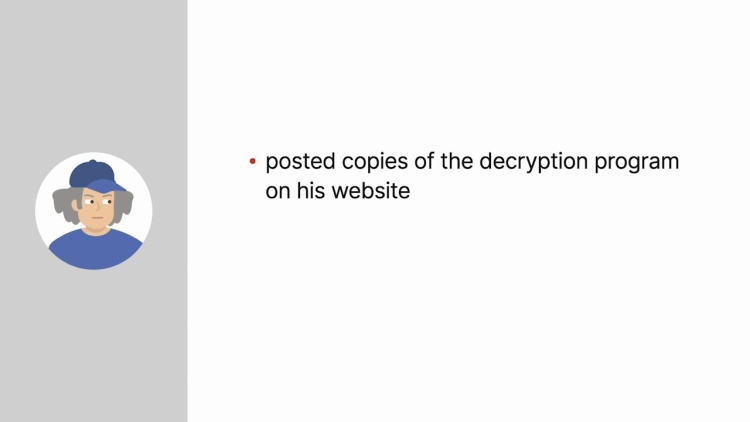Universal City Studios, Inc. v. Corley
United States Court of Appeals for the Second Circuit
273 F.3d 429 (2001)
- Written by Nicholas Decoster, JD
Facts
In 1999, Congress passed the Digital Millennium Copyright Act (DMCA). Under the DMCA, copyright holders are entitled to protect their digital works behind encryption codes. Provisions of the DMCA prohibit facilitating access to technology that would circumvent property-protecting encryptions. In 1996, Universal City Studios, Inc. (Universal) (plaintiff) and other movie studios collaborated to created the Content Scramble System (CSS). CSS protected video content on DVDs from being accessed or displayed without the proper algorithm and player keys. In 1999, several individuals successfully replicated the necessary algorithm and player keys. These individuals then wrote an encryption program entitled DeCSS that circumvented the CSS protection and allowed access to the DVD content. Eric Corley (defendant) posted copies of the computer code underlying DeCSS to his website with information about CSS and how DeCSS could be used to duplicate DVD content. Universal sued Corley for facilitating encryption-circumventing technology. Corley defended the posting of DeCSS on First Amendment grounds, arguing that computer code was protected speech. The district court held that posting DeCSS’s computer code and links to DeCSS violated the anti-circumvention provisions of the DMCA. The district court issued a permanent injunction prohibiting Corley from continuing to post or link to DeCSS on Corley’s website. Corley appealed the decision.
Rule of Law
Issue
Holding and Reasoning (Newman, J.)
What to do next…
Here's why 907,000 law students have relied on our case briefs:
- Written by law professors and practitioners, not other law students. 47,100 briefs, keyed to 996 casebooks. Top-notch customer support.
- The right amount of information, includes the facts, issues, rule of law, holding and reasoning, and any concurrences and dissents.
- Access in your classes, works on your mobile and tablet. Massive library of related video lessons and high quality multiple-choice questions.
- Easy to use, uniform format for every case brief. Written in plain English, not in legalese. Our briefs summarize and simplify; they don’t just repeat the court’s language.





